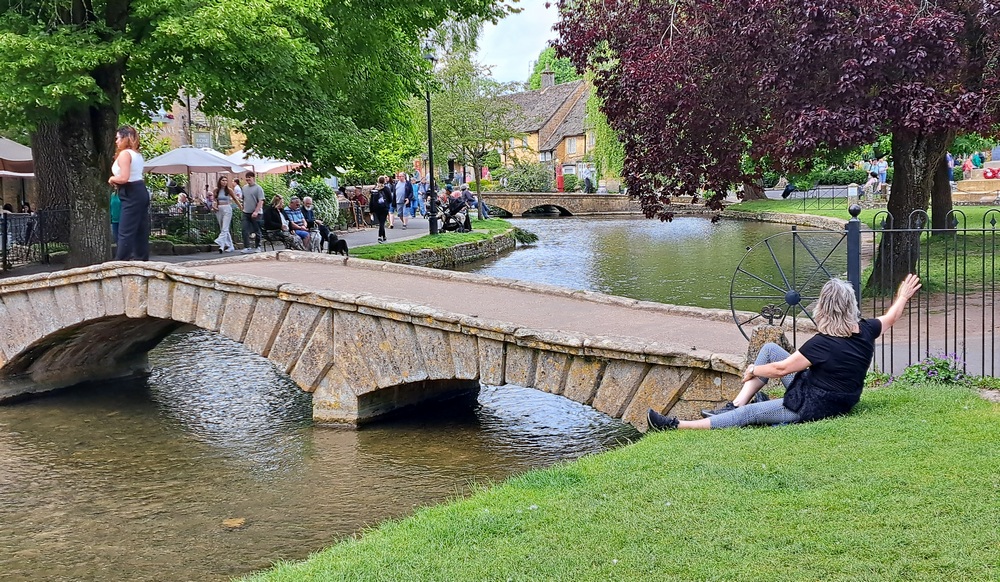TBM33: The Need for Dignity
Last week I wrote about small miracles like buying groceries with the help of your guardian angel because I figured, hey, people should know what it feels like to be “in the zone” even when there’s no emergency or sudden crisis.
So, of course, soon after I wrote the Miracles post I had to deal with an emergency . . .

“As he taught, he said, ‘Beware of the scribes, who like to walk around in long robes, and to be greeted with respect in the marketplaces, and to have the best seats in the synagogues and places of honor at banquets! They devour widows’ houses and for the sake of appearance say long prayers. They will receive the greater condemnation'” (Mark 12: 38 – 40). Photo credit Image*After.
I work at a business where there often are only two staff members on duty. The business is owned by an older couple who don’t believe in spending money on surveillance systems or up to date phone equipment, but usually it’s not a problem for us because our clients are honest, above board, and old-fashioned.
A few days ago, while I was working with only one co-worker, Janet, a man entered and asked if he could use our phone to call his dad for a ride. Janet said okay. It went downhill from there.
Michael (whose name we know because he introduced himself right away) is an immense mountain of a man, the sort of fellow they might cast as Paul Bunyan for a film. He’s at least 6’4″ and packs a huge number of pounds on a hefty frame. His eyes are intelligent and piercing, his voice, booming. To say that Michael is physically intimidating would be an understatement.
And Michael decided that while he was waiting for his dad, he’d like to spend some time interrogating Janet and me.
I worked in the mental health field in a clinical setting for almost five years, so my alarm bells instantly went off. Michael was clearly mentally ill. But he was also trying very hard to intimidate Janet and me through verbal means, and we both felt threatened. We could have tried calling the police, but I’m not keen to involve the police in cases of mental illness unless there’s an imminent threat. My instincts — my intuition — told me he could be persuaded to leave the store voluntarily if he was treated correctly.
For the next fifteen minutes, I used every ounce of my training, experience, and intuitive capacity to stay “in the zone” while I tried to make a link at a heart level with Michael. I had no time to stop and ask my angels what to do. I had to trust in the fact that they were right beside me, guiding me. And I had to trust in the fact that Michael’s angels were right there, guiding me. My job was to focus 100% on Michael — on his face, on his voice, on his body language, on his emotional intent. The angels’ job was to fling “quantum packets” at me that would come out of my mouth as the words Michael most needed to hear.
I’ve seen people’s behaviour when they’re suffering from major depression. And the manic phase of bipolar disorder. And the hallucinations and delusions of schizophrenia. And OCD. And narcissistic rage reactions. But I’ve never seen anyone whose pattern is quite like Michael’s.
Michael informed me every chance he got that he has autism. I seriously doubt the accuracy of this diagnosis. In my humble opinion, Michael is suffering from an obsessive compulsive personality disorder, though I didn’t come to this conclusion until I’d had a chance to review his behaviour after he’d left. (He had plenty of narcissistic features.)
Michael is a person who’s absolutely desperate to feel some sort of real connection with other people, some sort of real empathy. His need is genuine. His method of trying to get it is dysfunctional and dangerous. He’s been going around confronting people, demanding to know whether they care or not that he has autism. When people are rude to him (as they usually are) he responds by leaving nasty messages on their answering machines. He told us he’s also considering the idea of death threats to make people pay for being mean to him.
Yeah. Scary stuff.
So Michael tried his schtick on me. He expected the usual response — somebody trying to placate him with soothing lies so he’ll just go away. (It’s not like you can use brute force to tell this guy to leave.) What he got from me, though, was different. What he got from me was the truth.
It’s very easy to tell the truth and not get trapped by lies when you already have a habit of speaking the truth from the heart. So I told the truth, which is what my angels were urging me to do. (I could “feel” this guidance deep in my gut.)
Michael tried and tried to find a way to trap me in a lie. Maybe you think I’m “interpreting” his intent in a way that’s convenient for me, but I’m not. His goal was to interrogate me and trap me in a lie so he could prove to himself that, once again, he had not found anyone who cares. He revealed this himself when the content of his interrogation shifted. Suddenly he seemed less confident in his verbal attack. He started to say things such as, “So you think I shouldn’t leave nasty messages anymore,” and the real kicker, “So you’re telling me the truth.”
Near the end, our conversation went something like this:
“So you’re telling me the truth.”
“Yes, I’m telling you the truth.”
“I don’t like this truth.” (I had told him a minute before that he’s responsible for the way he treats other people despite the fact he has autism.)
“I’m sorry, but that’s the way it is.”
“Can you change the truth?”
“No, I can’t change it.”
“But I don’t like it.”
“There’s nothing I can do about that. Other people have difficult things to deal with, too.”
“You’re an honest person.”
“Yes, I’m an honest person.”
“And you’re telling me the truth.”
“Yes.”
“I didn’t think I’d ever meet an honest person” (as he was going out the door).
He actually said that out loud (surreal as it may seem) and I immediately thought of Diogenes travelling around ancient Greece in search of one honest man. (My son called the whole thing a Socratic nightmare.)
Michael’s problem, you see, is that he has an uncanny ability to sniff out the difference between truth and lies. He wants someone to tell him the truth from the heart — that is, truth spoken from a place of empathy and forgiveness, not anger and denial. Truth that gives him dignity and helps him believe in his own ability to make more loving choices. Truth that he can feel in his own battered heart. But people are afraid of him because he’s so big. So they don’t tell him the truth.
While he was standing there, I wasn’t afraid. (He could probably feel that, too.) I looked him in the eye and told him he’s a human being and a child of God and he can do better. The expression on his face was one of surprise. I don’t think anyone in his life has told him this before. But I believe it. So I said it.
Dignity is a powerful need for all human beings. Giving someone dignity is not the same thing as giving someone worship. Giving bows to the queen or the pope or your boss at work is a form of worship. Looking a mentally ill person in the eye and conveying with your whole heart your belief in his or her worthiness as a human being is dignity.
Telling someone that you care, while inside your own head you’re thinking they’re damned or weak or corrupt or full of sin or in need of true salvation or marked with the mark of Cain, is NOT giving dignity. It’s giving a friggin’ lie. Even if you don’t speak your judgmental thoughts out loud, your angels can hear them, and so can people like Michael.
Dignity comes from the heart. Dignity is received by the heart. Dignity is only possible where one soul says to another, “You and I are loved equally by God. Right now. In this moment. Together. We are both forgiven.”
When you are forgiven, you are forgiven.
God bless you, Michael.

























